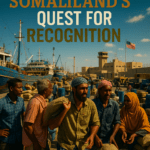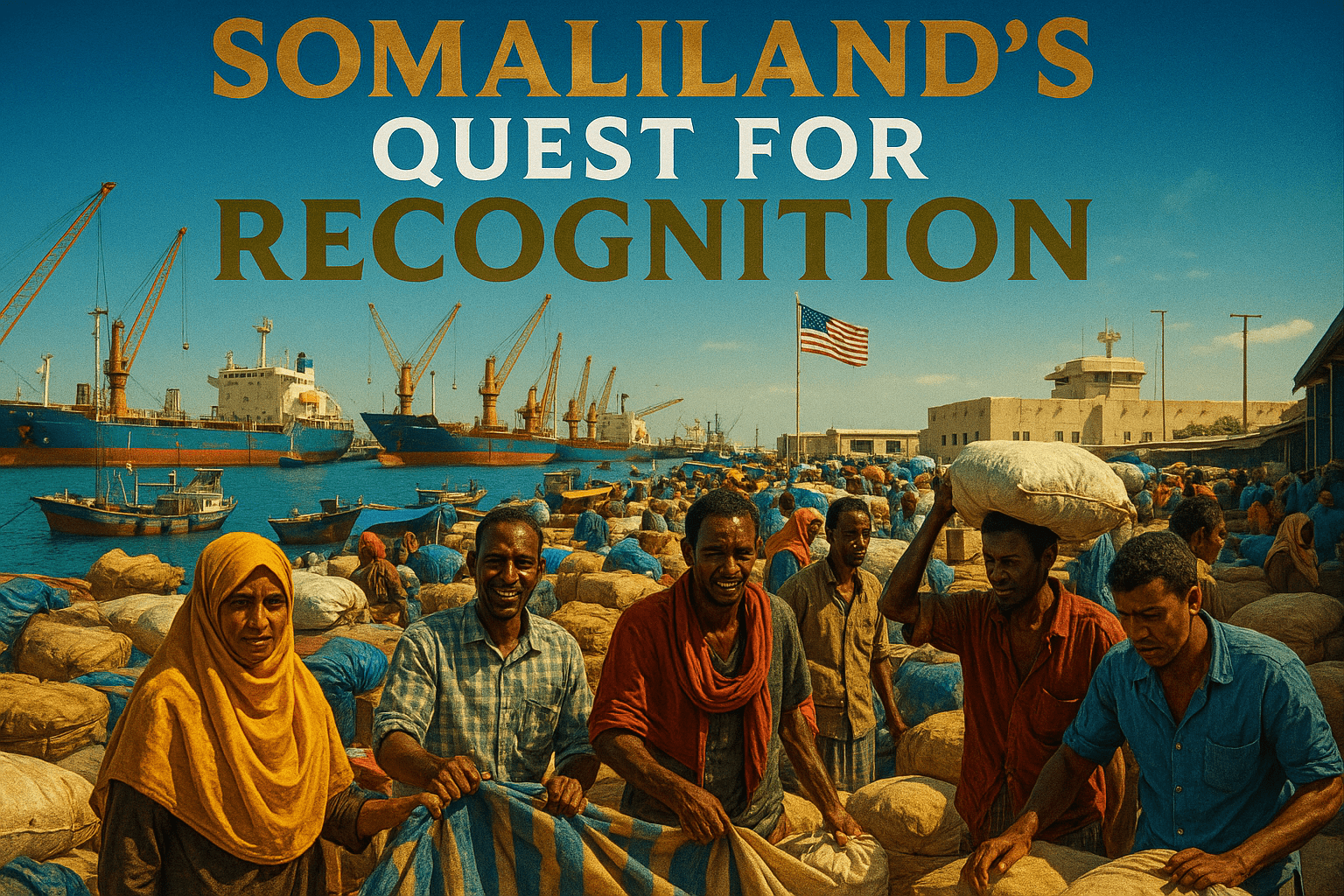

Somaliland’s Quest for US Recognition
By Darius Spearman (africanelements)
Support African Elements at patreon.com/africanelements and hear recent news in a single playlist. Additionally, you can gain early access to ad-free video content.
Somaliland’s Diplomatic Push
Somaliland, a region that declared its independence from Somalia in 1991, is actively seeking formal recognition from the United States. This diplomatic push includes an offer of a strategic military base and access to critical minerals in exchange for U.S. support (horndiplomat.com). Despite its stability and consistent democratic elections, Somaliland has not been recognized by the United Nations or most global powers (horndiplomat.com).
The term “de facto independence” applies to Somaliland because it functions as an independent state in practice. It has its own government, currency, and defined borders, even though it lacks formal international recognition. The distinction between “de facto” and “de jure” recognition is crucial here. “De facto” refers to a situation that exists in reality, while “de jure” signifies a state of affairs that is legally recognized. Somaliland possesses de facto independence but has yet to achieve de jure recognition from the international community.
Somaliland's International Recognition Status
Somaliland operates as an independent state in practice but lacks formal international recognition. Source: horndiplomat.com
Understanding International Recognition
International recognition involves a formal acknowledgment by other sovereign states or international organizations of a new state’s existence and its government’s legitimacy. Individual states typically grant this recognition through diplomatic actions or by international bodies such as the United Nations. Somaliland has not achieved widespread international recognition despite its relative stability and a 2003 referendum where 99% of voters supported independence (tamilguardian.com). Many nations adhere to the principle of respecting existing borders, fearing that recognizing Somaliland could destabilize the region by encouraging other secessionist movements within Somalia or elsewhere (nzz.ch).
Furthermore, Somalia actively lobbies against Somaliland’s recognition, asserting its own sovereignty over the territory (hiiraan.com). Some voices in Washington also advocate for caution regarding official recognition, expressing concerns that it could spark turmoil and jeopardize existing alliances with Somalia in combating militant groups (nzz.ch). Additionally, official recognition could potentially trigger local conflict, as some clans in eastern regions of Somaliland feel a stronger affiliation with Somalia than with the government in Hargeisa (nzz.ch).
The US Recognition Process
The legislative process for U.S. recognition of a foreign state involves both the executive and legislative branches. While the President, through the State Department, generally holds the authority to recognize foreign governments, Congress can influence or direct this policy through legislation. Bills like H.R.10402, for instance, would aim to mandate or encourage the executive branch to recognize Somaliland. The President would then have the option to sign such a bill into law, thereby formalizing U.S. recognition.
Even without specific legislation, the President can extend recognition. Congressional interest, as demonstrated by figures like Senator James Risch, can push for deeper engagement and partnerships, even if not explicitly advocating for full independence recognition as a U.S. policy objective (washingtonexaminer.com). With Donald Trump’s victory in the 2024 U.S. presidential election, there have been reports of an increased push for U.S. recognition of Somaliland (theconversation.com). Since March 2025, representatives of the Trump administration have engaged in discussions with Somaliland officials to establish a U.S. military base near Berbera in exchange for formal, albeit partial, recognition of Somaliland (allafrica.com).
Strategic Military Base in Berbera
The proposed U.S. military base would be located near Berbera, Somaliland’s largest port (allafrica.com). This location is geopolitically significant due to its strategic position on the Gulf of Aden, near the Bab el-Mandeb Strait. This strait is a critical chokepoint for global maritime trade, connecting the Red Sea to the Indian Ocean. A base here would allow for monitoring vital shipping lanes and enhance the ability to respond to regional crises (horndiplomat.com).
Benefits of a US Military Base in Berbera
- Strategic Location: Near Bab el-Mandeb Strait, critical for global maritime trade.
- Enhanced Influence: Strengthens US presence in the Horn of Africa.
- Counterterrorism: Bolsters efforts against groups like al-Shabab and Islamic State.
- Trade Route Security: Safeguards vital trade routes through the Gulf of Aden.
- Recognition for Somaliland: Could lead to international recognition and partnerships.
A base in Berbera offers significant strategic advantages for both the US and Somaliland. Source: horndiplomat.com
For the U.S., a base in Berbera would strengthen its influence in the Horn of Africa, bolster counterterrorism efforts against groups like al-Shabab and Islamic State, and safeguard trade routes (horndiplomat.com). The establishment of a U.S. military base in Somaliland would allow Washington to strengthen its maritime security presence in the Horn of Africa (tamilguardian.com). For Somaliland, offering a base could be a significant step towards gaining international recognition and securing economic and security partnerships with a major global power.
Impact on Regional Power Dynamics
The potential U.S. military base in Berbera would also impact the balance of power in the region. It could potentially challenge Djibouti’s strategic position, which currently hosts a U.S. military base at Camp Lemonnier (horndiplomat.com). The U.S. has considered establishing a base in Berbera to deepen its trade and security partnerships in the volatile Horn of Africa region (theconversation.com).
If the United States recognizes Somaliland in exchange for the military base, it would be a significant step toward legitimacy for the self-declared republic, potentially opening doors for international recognition and investment (horndiplomat.com). This move would be particularly impactful for a region that has sought recognition for decades. The strategic importance of Berbera has made it an area of interest for global powers, and a U.S. military base there would enhance America’s influence in the region (horndiplomat.com).
Trump Administration’s Approach
The Trump administration’s approach appears to involve an increased push for U.S. recognition of Somaliland compared to previous administrations (theconversation.com). This shift is motivated by strategic interests, particularly in countering China’s growing influence in the Horn of Africa. China established a naval support facility in Djibouti in 2017 (theconversation.com).
Trump Administration's Increased Push for Somaliland Recognition
The Trump administration's approach marks a shift in US policy towards Somaliland. Source: theconversation.com
The prospect of a U.S. military base in Berbera and deepening trade and security partnerships with Somaliland aligns with a strategy to enhance U.S. presence and counterterrorism efforts in the volatile region. Figures from Trump’s first term, such as Ambassador J. Peter Pham, have been outspoken critics of long-standing U.S. policy toward Somaliland, advocating for a re-evaluation of engagement (washingtonexaminer.com).
Somalia’s Counter-Lobbying Efforts
In response to growing Republican support for Somaliland’s recognition, Somalia has intensified lobbying efforts in Washington. It urges lawmakers to uphold the U.S. commitment to Somalia’s sovereignty (hiiraan.com). Somali diplomats have engaged with key figures in the State Department and Congress to counter Somaliland’s push for international legitimacy (hiiraan.com).
The U.S. has historically avoided recognizing Somaliland, citing diplomatic sensitivities with Mogadishu, which claims sovereignty over the self-declared state (tamilguardian.com). The U.S. is currently working with Somalia to combat militants from al-Shabab and Islamic State groups. Open support for Somaliland could jeopardize this alliance (nzz.ch). Some clans in certain eastern regions of Somaliland feel a stronger affiliation with Somalia than with the government in Hargeisa, suggesting internal divisions that Somalia could leverage (nzz.ch).
Ethiopia’s Role and Regional Dynamics
Ethiopia’s recent port deal with Somaliland has added another layer of complexity to the regional dynamics. In January 2024, Somaliland signed a deal with Ethiopia, granting the landlocked country access to Berbera port in exchange for potential recognition (tamilguardian.com). This move triggered a diplomatic crisis with Somalia (tamilguardian.com).
With Ethiopia recently signing a port deal with Somaliland in exchange for potential recognition, Washington may see an opportunity to formalize its presence in the region (tamilguardian.com). This development underscores the intricate web of alliances and rivalries in the Horn of Africa, where strategic interests often intersect with historical claims and aspirations for self-determination.
ABOUT THE AUTHOR
Darius Spearman has been a professor of Black Studies at San Diego City College since 2007. He is the author of several books, including Between The Color Lines: A History of African Americans on the California Frontier Through 1890. You can visit Darius online at africanelements.org.
